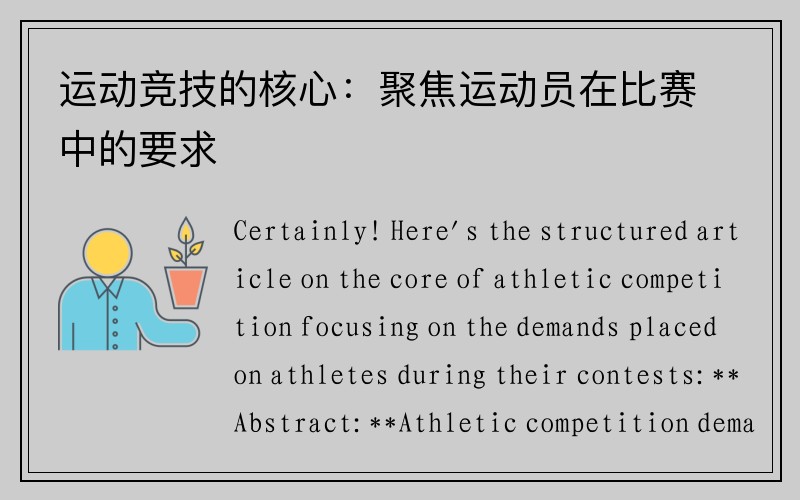运动竞技的核心:聚焦运动员在比赛中的要求
Certainly! Here's the structured article on the core of athletic competition focusing on the demands placed on athletes during their contests:
**Abstract:**
Athletic competition demands peak physical and mental performance from athletes. This article explores the fundamental aspects of competitive sports, highlighting the rigorous requirements athletes face during competitions.
---
1、Physical Demands
Athletic competitions impose significant physical demands on athletes, requiring superior strength, agility, and endurance. These demands vary widely across different sports disciplines.
Athletes must train rigorously to develop specific muscle groups and fine-tune their motor skills. For instance, in track and field events, sprinters focus on explosive power and stride technique, while long-distance runners build endurance through extensive mileage.
Moreover, team sports like soccer or basketball necessitate coordinated efforts among teammates, demanding not only individual prowess but also seamless integration within a team dynamic.
2、Mental Resilience
Beyond physical prowess, athletes must cultivate mental resilience to navigate the pressures of competition. Mental training encompasses strategies for maintaining focus, managing stress, and overcoming setbacks.
In individual sports such as tennis or golf, athletes face solitary battles against opponents and their own self-doubt. They must maintain composure during critical moments, relying on mental fortitude to stay competitive.
In team sports, athletes must communicate effectively under pressure, making split-second decisions that can determine the outcome of the game. This requires a collective mental toughness to withstand challenges and capitalize on opportunities.
3、Tactical Adaptability
Adaptability is crucial in competitive sports, where strategies evolve based on opponents’ strengths and weaknesses. Athletes and coaches analyze game dynamics to exploit tactical advantages.
In sports like chess or fencing, strategic planning is paramount, as athletes anticipate and counter their opponent’s moves. This strategic foresight requires both analytical thinking and intuitive decision-making.
Team sports involve constant tactical adjustments during gameplay, as athletes adapt formations and play styles to counteract opponents’ strategies. Coaches play a pivotal role in orchestrating these adjustments through sideline observations and strategic timeouts.
4、Emotional Control
Emotional control is essential for athletes to maintain focus and optimize performance throughout competitions. Managing emotions such as excitement, frustration, or anxiety is critical for consistent and effective play.
In high-stakes competitions like the Olympics or World Championships, athletes experience intense emotional highs and lows. They must channel these emotions positively to fuel their performance without succumbing to distractions.
Furthermore, team dynamics can be emotionally charged, requiring athletes to foster mutual respect and cohesion amidst competitive pressures. Effective team leaders often serve as emotional anchors, inspiring teammates and maintaining morale.

总结:
Athletic competition demands not only physical prowess but also mental resilience, tactical adaptability, and emotional control. Athletes must hone these attributes through rigorous training and strategic preparation to excel in competitive environments.
Ultimately, mastering these core demands empowers athletes to perform at their peak, achieving personal and team success in the dynamic world of sports.
---
This structure and content should effectively outline the rigorous demands athletes face during competitions, adhering to the specified formatting requirements.
Bsports网页版